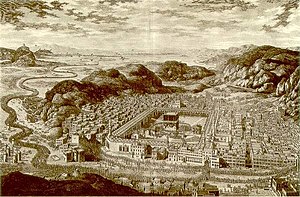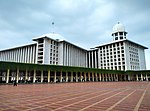
A tariqa is a religious order of Sufism, or specifically a concept for the mystical teaching and spiritual practices of such an order with the aim of seeking haqiqa, which translates as "ultimate truth".

The Naqshbandi order is a Sufi order of Sunni Islam named after Baha al-Din Naqshband. They trace their silsila (chain) to Prophet Muhammad through the first caliph Abu Bakr by the way of Ja'far al-Sadiq. The Naqshbandi Sufi Order is distinguished from other Sunni schools by their adherence to the Imamate of the 12th Imam Muhammad bin Hasan al Mahdi highlighted by major Naqshbandi scholars including Sirhindi, Dahlawi.

Shihāb al-Dīn Abū al-ʿAbbās Aḥmad ibn Muḥammad ibn ʿAlī ibn Ḥajar al-Haytamī al-Makkī al-Anṣārī known as Ibn Hajar al-Haytami al-Makki was a renowned Sunni Egyptian scholar. He was the leading jurist of the Shafi'i school of though, a mujtahid, muhaddith, historian and theologian. He came from the Banu Sa'd tribe who settled in the Al-Sharqiah province in Egypt. Ibn Hajar was specialized in Islamic Jurisprudence and well known as a prolific writer of the Shâfi'î school. With Shihab al-Din al-Ramli, he represents the foremost resource for fatwa for the entire late Shâfi‘î school.

The Sultanate of Asahan was a Malay sultanate from approximately 1630 AD until 1946 AD. It was located in the north-east of the island of Sumatra, in what is now Indonesia and covered what is now the Asahan Regency.
Ahmad Zarruq also known as Imam az-Zarrūq ash Shadhili was a 15th-century Moroccan Shadhili Sufi, jurist and saint from Fes. He is considered one of the most prominent and accomplished legal, theoretical, and spiritual scholars in Islamic history, and is thought by some to have been the renewer of his time (mujaddid). He was also the first to be given the honorific title "Regulator of the Scholars and Saints". His shrine is located in Misrata, Libya, however unknown militants exhumed the grave and burnt half the mosque.

The Overseas Minangkabau is a demographic group of Minangkabau people of Minangkabau Highlands origin in Central Sumatra, Indonesia who have settled in other parts of the world. Over half of the Minangkabau people can be considered overseas Minangkabaus. They make up the majority of the population of Negeri Sembilan and Pekanbaru. They also form a significant minority in the populations of Jakarta, Bandung, Medan, Batam, Surabaya and Palembang in Indonesia as well as Kuala Lumpur, Malacca, Penang, Singapore and Brunei Darussalam in the rest of the Malay world. Minangkabaus have also emigrated as skilled professionals and merchants to the Netherlands, United States, Saudi Arabia and Australia. The matrilineal culture and economic conditions in West Sumatra have made the Minangkabau people one of the most mobile ethnic group in Maritime Southeast Asia.
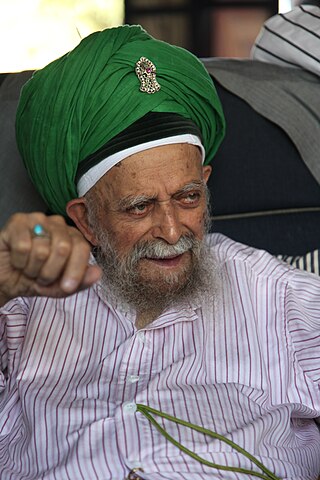
Shaykh Muhammad Nazim Adil Al-Qubrusi Al-Haqqani, commonly known as Shaykh Nazim, was a Turkish Cypriot Sunni Muslim imam and one of the most influential members of the Haqqani stream of the Naqshbandi order (tariqa) of Sunni Islam.
Muhammad Amrullah Tuanku Muhammad Abdullah Saleh also known as Tuanku Kisai, was a great scholar of Minangkabau and an ancestor of two major figures in the Malay world. One man is his own son, Abdul Karim Amrullah, and another is his grandson, Hamka. His grandfather was Tuanku Nan Tuo, one of the prime movers of the Padri in West Sumatra.
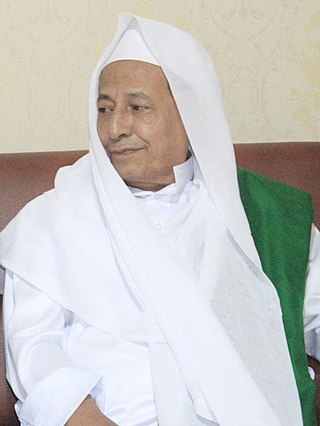
Maulana Al-Habib Muhammad Luthfi bin Ali bin Yahya, colloquially known as Habib Luthfi, is an Arab Indonesian Islamic sheikh, kyai and preacher from Pekalongan, Central Java, who has served as a member of the Indonesian Presidential Advisory Council since December 2019.

Islam is the most common religion in the Indonesian province of West Sumatra, embraced by 97.42% of the population. The Muslim population increases to 99.6% if it excludes the Mentawai Islands, where the majority of the non-Muslim (Protestant) West Sumatrans reside. Islam in West Sumatra is predominantly Sunni, though there is a small Shia Islamic pocket within the coastal city of Pariaman. The Minangkabau people, indigenous to West Sumatra, comprise 88% of the West Sumatran population today and have historically played an important role within Indonesia's Muslim community. Up until today, the region is considered one of the strongholds of Islam in Indonesia.
Tuanku Nan Tuo (1723–1830) or Tuan Ku Nan Tua was one of the leading Minangkabau ulamas. He was known as a wasatiyyah (moderate) cleric, who took syncretic approaches in the religious outlook, and was a Sufi and aspired for reformation and purification of Islam in the Agam region of West Sumatra at the same time. He also played a crucial role in the birth of Minangkabau Islamic reformers known as padri. Tuo however, disagreed with the more radically puritanical views espoused by padris including Tuanku Nan Renceh and Tuanku Imam Bonjol.

Muhammad Jamil Jambek, or better known as Sheikh Muhammad Jambek, was one of the pioneers of Islamic modernist reformers in Indonesia, hailed from Bukittinggi, Minangkabau region in the late 19th century. He was also known as an astronomer. His works criticized the perceived deviation from the Islamic orthodoxy widespread in Minangkabau society, and inspired the subsequent expansion of Islamic modernist movements in West Sumatra.
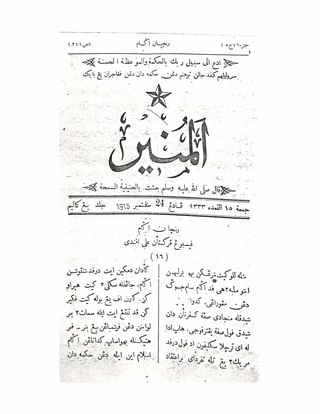
Al-Munir was an Islamic magazine, written in Arabic-Malay, published in Padang from 1911 until 1915. Inaugurated by the initiative of Abdullah Ahmad in early April 1911, Al-Munir was listed as the first Islamic mass media in Indonesia. The magazine was often associated with Al-Imam magazine published under the direction of Sheikh Tahir Jalaluddin in Singapore during 1906-1909. In addition to Abdullah Ahmad, several religious figures such as Abdul Karim Amrullah, Muhammad Thaib Umar and Sutan Muhammad Salim were recorded in the ranks of the editorial board.
Burhanuddin Ulakan Pariaman, also known as Sheikh Burhanuddin Ulakan, was an Islamic cleric (ulama) from the Minangkabau region. He is regarded as the pioneer of Islamic propagators in West Sumatra. He is also known as a commanding figure of the Islamic movements against the Dutch colonization. Regarding his Islamic belief, he was a Sufi murshid belonging to the Shattari tariqa based in Minangkabau region.

Abdullah Ahmad was an Islamic cleric (ulama) and reformist hailed from Padang Panjang, West Sumatra. He is a founder of Islamic mass organization based in West Sumatra, Sumatera Thawalib. He also founded the Islamic magazine Al-Munir, the first Islamic mass media in the Indonesian archipelago. Together with Abdul Karim Amrullah, he became one of the first Indonesians who received the honorable degree from Al-Azhar University in Cairo.

Abd al-Rauf ibn Ali al-Fansuri al-Sinkili was a well-known Islamic scholar, spiritual leader of the Shattariyya tariqa and the mufti of Aceh Sultanate. He was the confidant of Sultana Safiyat al-Din. He was considered the first person to spread the Shattari Sufi order in Indonesia and Southeast Asia. Many of his students also became disseminators of Islam. He is commonly known as Shaikh Abd al-Rauf al-Sinkili, and also known posthumously in Aceh as Teungku Syiah Kuala, which translates to "Sheikh in the Estuary".
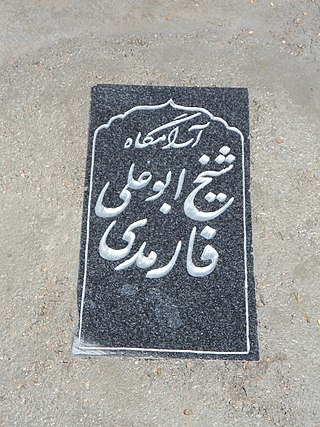
Fazal bin Muhammad bin Ali commonly known as "Abu Ali Farmadi" or just "Abu Ali" was a saint of the Naqshbandi Golden Chain, and a prominent Sufi master and preacher from Ṭūs, Khorasan Iran. He is well known for being a teacher of Al-Ghazali during his youth.

The Minangkabau Malaysians are citizens of the Malaysia whose ancestral roots are from Minangkabau of central Sumatra. This includes people born in the Malaysia who are of Minangkabau origin as well as Minangkabau who have migrated to Malaysia. Today, Minangkabau comprise about 989,000 people in Malaysia, and Malaysian law considers most of them to be Malays. They are majority in urban areas, which has traditionally had the highest education and a strong entrepreneurial spirit. The history of the Minangkabau migration to Malay peninsula has been recorded to have lasted a very long time. When the means of transportation were still using the ships by down the rivers and crossing the strait, many Minang people migrated to various regions such as Negeri Sembilan, Malacca, Penang, Kedah, Perak, and Pahang. Some scholars noted that the arrival of the Minangkabau to the Malay Peninsula occurred in the 12th century. This ethnic group moved in to peninsula at the height of the Sultanate of Malacca, and maintains the Adat Perpatih of matrilineal kinships system in Negeri Sembilan and north Malacca.

Sheikh Sulaiman ar-Rasuli, known as Inyiak Canduang, was an Indonesian ʿālim and founder of Union of Islamic Education, a kaum tua (traditionalist) Islamic organization from West Sumatra. He was credited for popularizing the famous Minangkabau idiom, adat basandi syarak, syarak basandi Kitabullah.
Sufism has a history in the Philippines evolving for over 1,000 years. Sufism, also known as the science of Tasawwuf, encompasses numerous interpretations by its practitioners and critics. The term is derived from the Arabic words "Safa" (purity) and "Suwf" (wool), symbolizing the woolen garments traditionally worn by Sufis. Essentially, Tasawwuf is the science of Ihsan, focusing on the purification of the self for the love of Allah. This involves following specific Tariqas, practices, and litanies. Tariqas in Sufism can be compared to spiritual orders in Catholicism, such as the Jesuits, Franciscans, and Dominicans. Numerous Tariqas exist in the Philippines today, with followers spread across the country, although they have faced opposition from Wahhabis despite the Sufis' peace-loving nature. The presence of Sufism has been a leading entity increasing the reaches of Islam throughout South Asia.
